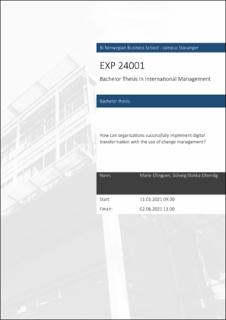How can organizations successfully implement digital transformation with the use of change management?
Bachelor thesis
Permanent lenke
https://hdl.handle.net/11250/2788668Utgivelsesdato
2021Metadata
Vis full innførselSamlinger
- Bachelor [817]
Sammendrag
External forces like Industry 4.0 and the emergence of Covid-19 have put pressure
on organizations to change. As organizations try to prepare and adapt to these
forces, they look to implement changes that include modernization and advanced
technology (Irvine, 2020). Through the pandemic, it is clear that some
organizations have managed to successfully adapt to these changes, while some
have experienced failure. This raises the question; what are the key factors of
succeeding with digital transformation? While there are countless strategies and
theoretical frameworks on approaching change, it is surprising to see that 70% of
all digital transformations fail to achieve their intention (Forth et al., 2020).
Change management is a term that has increased relevance in the last decade.
Change management is a framework that focuses on the people’s and employees’
side of change (Jägare et al., 2019). This opens up a new dimension to digital
transformation and makes it more complex. Putting human perspective at the core
of the change process, brings new opportunities as well as challenges. Providing
personalized experiences and individual communication has been revolutionary
for many organizations. However, it can bring challenges such as resistance to
change and the need for further resources and capabilities.
“Change never starts, because it never stops”
(Weick & Quinn, 1999)
Based on the theoretical framework and insights from qualitative research
methods, a new model presents digital transformation as a continuous and
complex process. The model puts human perspectives at the core, and
recommends the four phases; prepare for change, craft a flexible plan for change,
implementation process and analysis and review. Throughout changes,
organizations must prioritize individuals as the most significant aspect in change
management. Covid-19 reminded us that it is impossible to foresee what the
future holds. Thus, having a continuous change process that “never stops”, is
essential for an organization to survive and keep a competitive advantage.
Beskrivelse
Bacheloroppgave i International Management fra Handelshøyskolen BI, 2021
